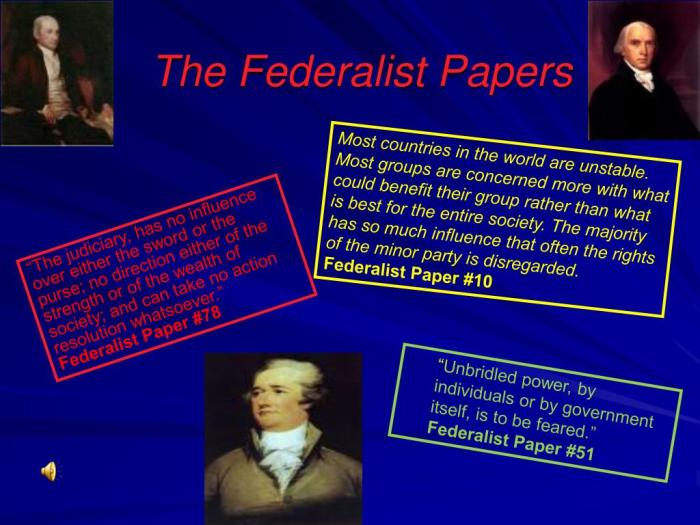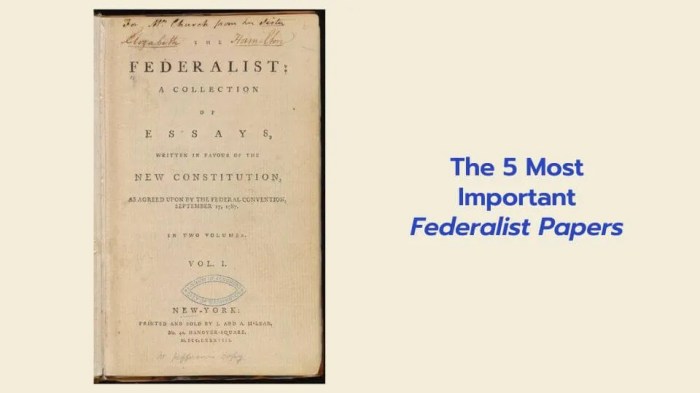Introducing the Federalist 78 Questions and Answers, a comprehensive guide that delves into the historical significance, key arguments, structure, and rhetorical devices employed in this influential essay. This guide provides a thorough understanding of Federalist 78, its impact on the ratification of the Constitution, and its continued relevance to contemporary political debates.
Federalist 78, penned by Alexander Hamilton, is a seminal work that played a pivotal role in shaping the American political landscape. Its arguments in favor of a strong central government and a federal system have had a lasting impact on American political thought and continue to resonate in modern discussions about the role of government.
Historical Context

Federalist 78 holds significant historical importance as it played a crucial role in the ratification of the United States Constitution.
Authored by Alexander Hamilton, the essay was written in 1788 as part of a series of 85 essays known as The Federalist Papers.
The Federalist Papers were intended to persuade the public to support the ratification of the newly drafted Constitution, which aimed to replace the Articles of Confederation.
Key Arguments: Federalist 78 Questions And Answers
The Need for a Strong National Government
Hamilton argued that the Articles of Confederation had failed to create a strong and effective national government.
He believed that a strong central government was necessary to protect the nation from foreign threats, regulate commerce, and promote economic growth.
The Separation of Powers
Hamilton emphasized the importance of separating the powers of government into three branches: legislative, executive, and judicial.
He argued that this separation would prevent any one branch from becoming too powerful and would ensure a system of checks and balances.
The Role of the Judiciary
Hamilton argued that the judiciary should play a vital role in interpreting the Constitution and ensuring that laws passed by the legislature were constitutional.
He believed that the judiciary would serve as a check on the other branches of government and protect the rights of individuals.
Structure and Organization
Federalist 78 is well-organized and logical in its structure.
The essay begins with an introduction that states the main purpose of the essay: to argue for the ratification of the Constitution.
The body of the essay is divided into three main sections, each of which addresses a key argument in favor of the Constitution.
The essay concludes with a summary of the main arguments and a call to action for the reader to support the ratification of the Constitution.
Rhetorical Devices

Appeals to Reason
Hamilton used logical arguments and evidence to support his claims.
He cited historical examples and drew parallels to other successful governments to demonstrate the benefits of a strong national government.
Appeals to Emotion
Hamilton also employed emotional appeals to persuade his audience.
He warned of the dangers of a weak national government and appealed to the reader’s sense of patriotism and desire for a prosperous future.
Rhetorical Questions
Hamilton used rhetorical questions to engage the reader and challenge their assumptions.
By posing questions that could not be easily answered, he forced the reader to confront the weaknesses of the Articles of Confederation and the need for a stronger national government.
Impact and Legacy
Federalist 78 had a significant impact on the ratification of the Constitution.
Its persuasive arguments and logical structure helped convince many delegates to support the Constitution at the Constitutional Convention.
The essay’s ideas have continued to influence American political thought and constitutional law.
The principle of separation of powers, the role of the judiciary, and the need for a strong national government remain fundamental principles of the American political system.
Comparative Analysis

Comparison to Federalist 10, Federalist 78 questions and answers
Federalist 78 shares some similarities with Federalist 10, which was also written by James Madison.
Both essays argue for the need for a strong national government to protect the nation from foreign threats and promote economic growth.
However, Federalist 78 focuses more on the structure of the government and the role of the judiciary, while Federalist 10 focuses on the dangers of factions and the need for a large republic.
Comparison to Federalist 51
Federalist 78 also shares similarities with Federalist 51, which was written by James Madison and Alexander Hamilton.
Both essays discuss the importance of separating the powers of government and creating a system of checks and balances.
However, Federalist 78 focuses more on the role of the judiciary in interpreting the Constitution, while Federalist 51 focuses on the role of the legislative branch in making laws.
Modern Applications
The principles set forth in Federalist 78 continue to be relevant to contemporary political debates.
The debate over the role of the federal government in regulating the economy, protecting individual rights, and ensuring national security often draws upon the arguments presented in Federalist 78.
For example, those who argue for a strong federal government often cite the need to protect the nation from terrorism and promote economic growth.
Those who argue for a more limited federal government often cite the need to protect individual rights and prevent government overreach.
Commonly Asked Questions
What is the main argument presented in Federalist 78?
Federalist 78 argues for the necessity of a strong central government to protect individual rights and promote the common good.
Who wrote Federalist 78?
Federalist 78 was written by Alexander Hamilton.
What is the structure of Federalist 78?
Federalist 78 is divided into three main parts: an introduction, a body, and a conclusion.
What rhetorical devices are used in Federalist 78?
Federalist 78 employs a variety of rhetorical devices, including analogy, metaphor, and repetition.
What is the impact of Federalist 78 on American political thought?
Federalist 78 has had a profound impact on American political thought, shaping debates about the role of government and the balance between individual liberty and national security.